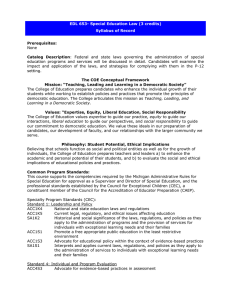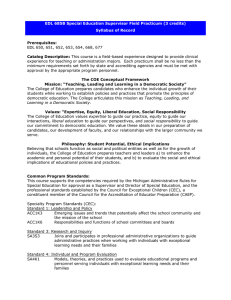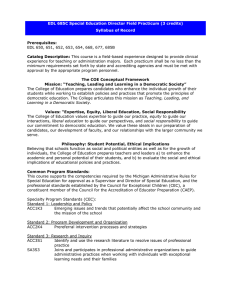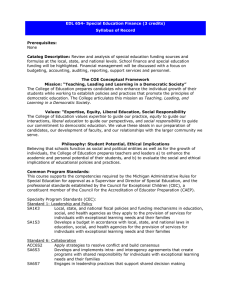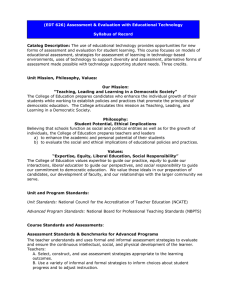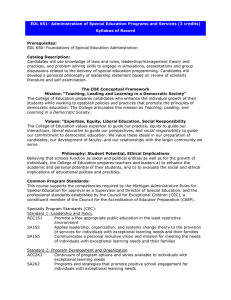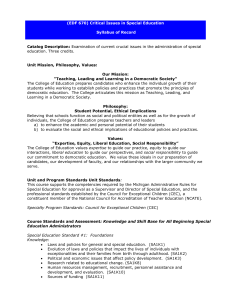(EDL 650) Foundations of Special Education Administration Syllabus of Record Prerequisites:
advertisement
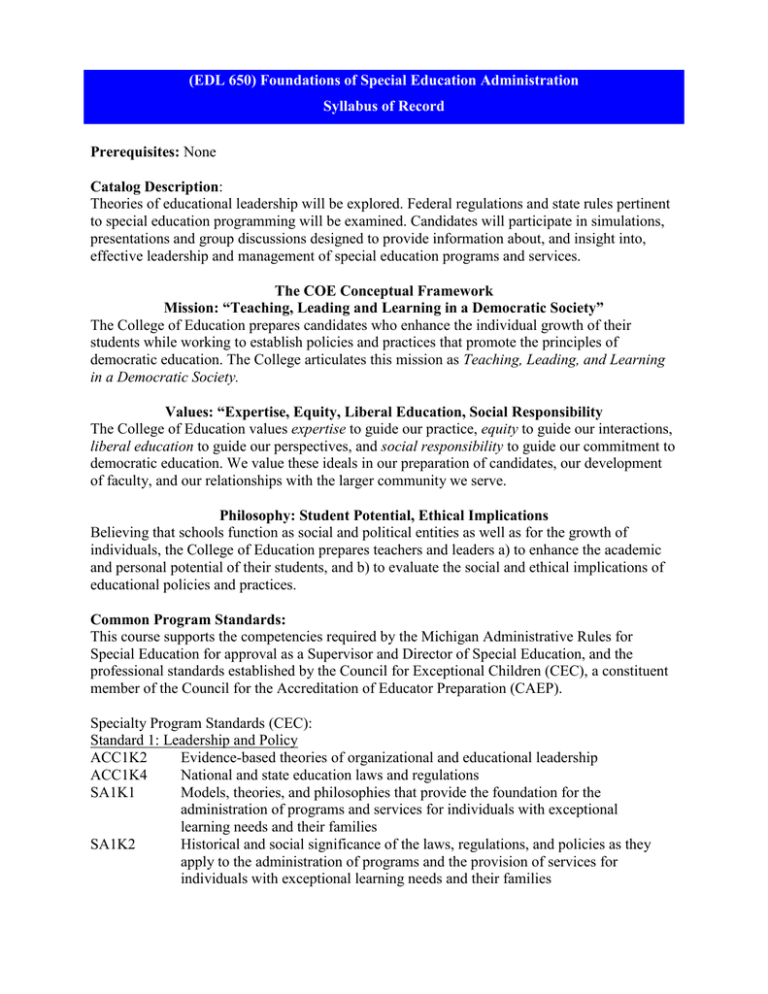
(EDL 650) Foundations of Special Education Administration Syllabus of Record Prerequisites: None Catalog Description: Theories of educational leadership will be explored. Federal regulations and state rules pertinent to special education programming will be examined. Candidates will participate in simulations, presentations and group discussions designed to provide information about, and insight into, effective leadership and management of special education programs and services. The COE Conceptual Framework Mission: “Teaching, Leading and Learning in a Democratic Society” The College of Education prepares candidates who enhance the individual growth of their students while working to establish policies and practices that promote the principles of democratic education. The College articulates this mission as Teaching, Leading, and Learning in a Democratic Society. Values: “Expertise, Equity, Liberal Education, Social Responsibility The College of Education values expertise to guide our practice, equity to guide our interactions, liberal education to guide our perspectives, and social responsibility to guide our commitment to democratic education. We value these ideals in our preparation of candidates, our development of faculty, and our relationships with the larger community we serve. Philosophy: Student Potential, Ethical Implications Believing that schools function as social and political entities as well as for the growth of individuals, the College of Education prepares teachers and leaders a) to enhance the academic and personal potential of their students, and b) to evaluate the social and ethical implications of educational policies and practices. Common Program Standards: This course supports the competencies required by the Michigan Administrative Rules for Special Education for approval as a Supervisor and Director of Special Education, and the professional standards established by the Council for Exceptional Children (CEC), a constituent member of the Council for the Accreditation of Educator Preparation (CAEP). Specialty Program Standards (CEC): Standard 1: Leadership and Policy ACC1K2 Evidence-based theories of organizational and educational leadership ACC1K4 National and state education laws and regulations SA1K1 Models, theories, and philosophies that provide the foundation for the administration of programs and services for individuals with exceptional learning needs and their families SA1K2 Historical and social significance of the laws, regulations, and policies as they apply to the administration of programs and the provision of services for individuals with exceptional learning needs and their families Standard 3: Research and Inquiry SA3K1 Research in administrative practices that supports individuals with exceptional learning needs and their families SA3S2 Develops data-based educational expectations and evidence-based programs that account for the impact of diversity on individuals with exceptional learning needs and their families Standard 5: Professional Development and Ethical Practice ACC5K2 Moral and ethical responsibilities of educators SA5K1 Ethical theories and practices as they apply to the administration of programs and services with exceptional learning needs and their families ACC5S1 Model ethical behavior and promote professional standards ACC5S3 Use ethical and legal discipline strategies Standard 6: Collaboration ACC6S2 Apply strategies to resolve conflict and build consensus SA6S7 Engages in leadership practices that support shared decision making Objectives: By the end of the course, the candidate will demonstrate knowledge and skill in these areas: -Theoretical framework for educational leadership -Administrative behavior related to effectiveness, conflict management and management theory -Historical development of special education, including federal and state legislation -Leadership and management of special education programs and services Major Topics: Theories of Educational Leadership Collaborative Problem-Solving and Decision-Making Conflict Management Section 504 Special Education Legislation Individuals with Disabilities Act Michigan Mandatory Special Education Act Michigan Administrative Rules for Special Education Student Discipline Chairing the IEP Team Meeting Homebound/Hospitalized Services Auxiliary Services Act Michigan’s State Performance Plan for Special Education Methods of Evaluation: 60%- Three short essay examinations 25%- Research Paper- Educational Leadership Theory 15%- Group Presentation- Selected educational leadership theory 10%- Participation and small group work Suggested Text: Crockett, J., Billingsley, B., & Boscardin, M. (Eds.)(2012). Handbook of leadership and administration for special education. New York, NY: Routledge. Kouzes, J. & Posner, B. (2003). The leadership challenge. San Francisco, CA: Jossey-Bass. Northouse, P. (2010). Leadership theory and practice. Thousand Oaks, CA: Sage Publications.
